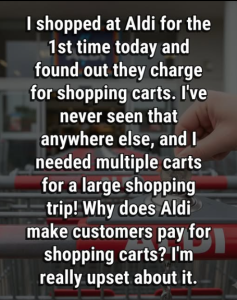
Why Does Aldi Make Customers Pay for Shopping Carts? The Real Reasons Behind a Smart System
If you’ve ever shopped at Aldi, one of the first things you notice—even before the low prices or the small store layout—is the shopping cart system. Unlike most grocery stores where carts sit freely at the entrance, Aldi requires customers to insert a quarter (or a local equivalent coin) to unlock a cart. When the cart is returned, the customer gets the quarter back.
At first glance, it may seem strange. Why would a grocery store chain make you “rent” a shopping cart for a few minutes? The answer lies in Aldi’s unique business model, one that is built around efficiency, cost-cutting, and customer responsibility. And while the system may appear simple, it’s surprisingly effective—and it plays a major role in how Aldi keeps prices so low.
This 1,000-word breakdown explains the real logic behind the system, how it benefits both the company and shoppers, and why it’s considered one of the smartest retail strategies in the business.
1. The Shopping Cart Deposit System Saves Labor Costs
One of the biggest reasons behind Aldi’s coin-operated carts is labor efficiency.
At most grocery stores, employees must:
-
Gather carts scattered across the parking lot
-
Retrieve carts left near curbs
-
Return them to the store entrance
-
Make multiple rounds daily, especially during busy hours
Aldi avoids almost all of this.
How?
Because customers receive their quarter back only when they return the cart, shoppers almost always bring their carts back to the designated area. This eliminates the need for employees to chase carts around the parking lot.
What does that mean for Aldi?
Fewer employees = lower labor costs.
And lower labor costs = lower prices for customers.
This is central to Aldi’s business model. Every operational saving, no matter how small, is passed directly to shoppers in the form of cheaper groceries.
2. The System Prevents Cart Loss and Theft
Shopping carts are shockingly expensive. A single high-quality cart can cost anywhere from $75 to $250, and in some regions, even more.
Many grocery stores deal with carts disappearing from:
-
Parking lots
-
Streets
-
Apartments
-
College campuses
-
Bus stops
Some carts are stolen intentionally; others are simply abandoned blocks away.
Aldi’s coin system discourages cart theft effortlessly. Most people won’t push a cart out of the lot if it means losing their quarter—or local coin. Even more importantly, people are far more likely to return the cart properly to reclaim their deposit.
The impact?
-
Far fewer lost carts
-
Far fewer damaged carts
-
Far less money wasted on replacements
Again, reduced costs = lower grocery prices for customers.
3. It Keeps Parking Lots Organized and Safer
One of the most overlooked benefits of the Aldi cart system is the effect it has on parking lot safety and cleanliness.
Because customers return carts:
-
Carts are not left between parking spaces
-
Cars are less likely to be scratched
-
The lot stays tidier
-
No loose carts roll in the wind
Most stores need dedicated workers constantly collecting carts to avoid these issues. Aldi avoids the clutter automatically.
A clean, organized parking lot also improves the overall customer experience from the moment shoppers arrive.
4. It Speeds Up the In-Store Checkout Line
Aldi stores run extremely efficiently, and checkout speed is one of their trademarks. The cart system plays a supporting role here as well.
Because carts are returned neatly:
-
Cashiers always have enough carts
-
The flow of customers is faster
-
Carts can easily be swapped between customers at checkout
Checkout clerks often keep an empty cart behind them so shoppers can move items from the conveyor belt quickly, allowing the next customer to begin unloading. This unique Aldi method helps keep lines moving at impressive speeds.
5. It Encourages a Culture of Responsibility and Community
Another subtle but powerful reason behind Aldi’s cart system is social behavior.
The system creates a tiny incentive for people to do the right thing—return their cart. And because Aldi shoppers know the routine, it builds a sense of shared responsibility.
Many people even:
-
Return multiple carts at once
-
Give their cart to another shopper
-
Receive a cart from someone leaving (often for free)
The deposit system, though small, creates big behavioral consistency. It also results in an unspoken “we help each other here” atmosphere that Aldi customers often talk about.
6. Reducing Overhead Is What Makes Aldi Aldi
Aldi’s entire operation revolves around minimizing costs in clever ways that do not reduce quality. The quarter cart system is just one example.
Other Aldi efficiencies include:
-
Shoppers bag their own groceries
-
Boxes double as shelf displays
-
Limited store sizes
-
Fewer employees
-
Private-label products that reduce costs
-
Minimal store décor
Everything Aldi does is designed to cut operational expenses.
The money saved is reinvested into:
-
Better-quality products
-
Cheaper everyday prices
-
More efficient stores
Aldi’s cart deposit system is not a gimmick; it’s an essential part of the company’s philosophy.
7. Customers Actually Prefer the System Once They Learn It
Although first-time shoppers sometimes find the system confusing, most customers grow to appreciate it.
They enjoy:
-
A cleaner parking lot
-
Neater entrance areas
-
Always-available carts
-
Lower food prices
-
A sense of order
Many shoppers even bring a special keychain quarter holder for convenience, showing how normal and accepted the system has become.
And importantly, Aldi keeps the deposit small. A quarter is enough motivation to return the cart, but not enough money to feel like a burden.
8. Aldi Doesn’t Profit From the Deposit
Some people mistakenly believe Aldi makes money from unreturned carts. In reality, Aldi does not profit from the quarter system.
If a customer leaves their cart, another shopper simply takes it—and keeps the quarter. Aldi neither gains nor loses from the deposit itself. The system works entirely through customer behavior rather than financial gain.
9. It’s Environmentally Friendly
By keeping carts organized and minimizing replacements, Aldi also reduces:
-
Waste
-
Manufacturing emissions
-
Transportation costs
Fewer new carts needed = smaller environmental footprint.
It’s a green practice disguised as a simple coin system.
Conclusion: The Quarter Isn’t a Fee—It’s a Strategy
Aldi’s shopping cart deposit system may look unusual if you’re new to the store, but it’s actually a core part of what makes Aldi successful. For a single quarter, customers become part of a brilliant efficiency loop that benefits everyone:
-
Parking lots stay tidy
-
Carts stay available
-
Stores stay efficient
-
Costs stay low
-
Prices stay cheap
Aldi doesn’t use the system to earn money—it uses it to save money. And every one of those savings helps keep Aldi one of the most affordable grocery stores in the world.

